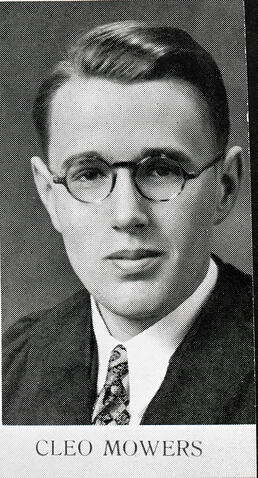
Title and statement of responsibility area
Title proper
Cleo Mowers - Portrait
General material designation
- Graphic material
Parallel title
Other title information
Title statements of responsibility
Title notes
Level of description
Item
Reference code
Edition area
Edition statement
Edition statement of responsibility
Class of material specific details area
Statement of scale (cartographic)
Statement of projection (cartographic)
Statement of coordinates (cartographic)
Statement of scale (architectural)
Issuing jurisdiction and denomination (philatelic)
Dates of creation area
Date(s)
-
[ca. 1938] (Creation)
Physical description area
Physical description
1 negative : b&w ; 10 x 13 cm
Publisher's series area
Title proper of publisher's series
Parallel titles of publisher's series
Other title information of publisher's series
Statement of responsibility relating to publisher's series
Numbering within publisher's series
Note on publisher's series
Archival description area
Name of creator
Custodial history
Scope and content
Head and shoulders image of Cleo Mowers, St. Andrew's College student and editor of The Sheaf.
Bio/Historical Note: Cleo Walter Mowers was born in 1915 on the family farm at Sibbald, Alberta and educated at Highland Park School at Sibbald and as well at Alsask, Saskatchewan. He received his BA from the University of Saskatchewan in 1938 and took post-graduate theology studies at St. Andrew's College in Saskatoon. Mowers served as editor of the student newspaper “The Sheaf” in 1938-1939. Mowers, a pacifist, and Fred McNeill, news manager, were fired by the Students Representative Council for publishing an anti-war issue the day before Armistice (11 November 1938). The particular articles quoted as reasons for his dismissal were student articles; among them was a feature article written by Doug Cherry (U of S dean of Arts and Science from 1969-1981), containing the remark that the last war was fought so the rich could make money and that the soldiers were duped into taking part in it by talk of patriotism.
Mowers started his career in journalism at the Saskatoon Star-Phoenix in 1939 and was later employed by the Winnipeg Free Press for two years, and the Calgary Albertan (as associate editor) for 16 years. In 1960 Max Bell, having acquired the Lethbridge (Alberta) Herald, appointed Mowers editor and publisher. Mowers held these positions until he left The Herald after it was sold to the Thomson Newspapers chain in 1980. He organized a conference in Lethbridge in 1974 that led to the formation of the Canada West Foundation. Mowers received an honourary Doctor of Laws degree from the University of Lethbridge and was the founding president of the Nikka Yuko Centennial Gardens. Mowers served as president of Lethbridge Chamber of Commerce from 1966-1967. He served on the Metric Commission Canada from 1981-1983. In 1991 Mowers published a political book he had edited, entitled "Towards a New Liberalism". He was awarded the Queen's Jubilee Medal in 1992. Cleo Mowers died in 2003 in Lethbridge at age 87.
Notes area
Physical condition
Immediate source of acquisition
Arrangement
Language of material
Script of material
Location of originals
Availability of other formats
Restrictions on access
There are no restrictions on access.
Terms governing use, reproduction, and publication
Photographer: unknown
Copyright holder: unknown
Other terms: Responsibility regarding questions of copyright that may arise in the use of any images is assumed by the researcher.

